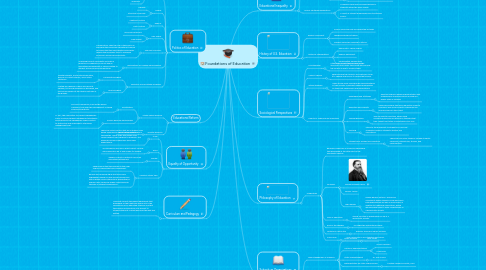
1. Equality of Opportunity
1.1. Class
1.1.1. There are several factors that will influence class based experiences. This situation always favors the wealthy. Upper class and middle class families expect their children to graduate. The working class and underclass have lower expectations.
1.2. Race
1.2.1. An individual;s race has a direct impact on how much education he or she is likely to achieve.
1.3. Gender
1.3.1. Gender is directly related to his or her educational attainment.
1.4. Coleman Study 1982
1.4.1. People found that the findings to the High School Achievement was insignificant.
1.4.2. Borman and Dowling argue that the school segregation based on race and socioeconomic status within school interactions dominated by middle-class values are largely responsible for the gaps in student achievement.
2. Curriculum and Pedagogy
2.1. Humanist reflects the idealist philosophy that knowledge of the traditional liberal arts is the cornerstone of an educated citizenry and that the purpose of education is to present to students the best of what has been thought and written.
3. Educational Reform
3.1. School Based Reforms
3.1.1. Privatization
3.1.1.1. For profit companies, such as the Edison Company, took over the management of failing schools and districts.
3.1.2. School-Business Partnerships
3.1.2.1. In 1991, the Committee to Support Philadelphia Public Schools pledged management assistance and training to the Philadelphia School District to restructure and implement a site based management plan.
3.2. Societal Reforms
3.2.1. Parent-community ties
4. Politics of Education
4.1. Conservative
4.1.1. Free market
4.1.2. Maximization of economic growth
4.1.3. Individual
4.2. Liberal
4.2.1. Equality
4.2.2. Structure of society
4.3. Radical
4.3.1. Capitalist System
4.3.2. Multi-cultural
4.4. Neo-liberal
4.4.1. Rid of social groups
4.4.2. Free market
4.5. The Role of School
4.5.1. Conservative- sees the role of the school as providing the necessary educational training to ensure that the most talented individuals receive the necessary tools to maximize economic and social productivity.
4.6. Explanations of Unequal Performances
4.6.1. Schooling has not sufficiently provided a reduction in inequality of results and as educational achievement is closely related to student socioeconomic backgrounds
4.7. Definition of Educational Problems
4.7.1. Conservative argues
4.7.1.1. Greater equality, multicultural education, decline of cultural literacy, and cultural relativism.
4.7.2. Liberals argues
4.7.2.1. Limited life chances of poor and minority children, too much emphasis on discipline, and curriculum leaves out the diverse cultures of the groups.
5. Educational Inequality
5.1. Cultural Deprivation
5.1.1. Intellectual Development
5.1.1.1. Cultural deprivation theorist argue that many working class homes do not have the books and materials to stimulate a child's intellectual development.
5.1.2. Language
5.1.2.1. They describe lower class families communicate by gestures or single word phrases.
5.2. School Centered Explanations
5.2.1. Academic performance among groups of students within the same school
5.2.2. A result of student differences prior to entering school
6. History of U.S. Education
6.1. Reform Movement
6.1.1. School should be free and supported by taxes
6.1.2. Teachers should be trained
6.1.3. Children should be required to attend
6.2. Historical Interpertation
6.2.1. Democratic-Liberal School
6.2.2. Radical-Revisionist
6.2.3. Conservative Perspectives
7. Sociological Perspectives
7.1. Functionalism
7.1.1. a theory of society that focuses on the structures that create the society and on how the society is able to remain stable.
7.2. Conflict Theory
7.2.1. observes how the unrest in a society will cause it to change and evolve to relieve the tension.
7.3. Interactionalism
7.3.1. looks at how every individual will give everything in their society a different meaning depending on their past experiences and expectations.
7.4. Effects of Schooling on Individuals
7.4.1. Knowledge and Attitudes
7.4.1.1. Effective schools research demonstrates that academically oriented schools do produce higher rates of learning.
7.4.2. Education and Mobility
7.4.2.1. Americans believe that more education leads to economic and social mobility; individuals rise and fall based on their merit.
7.4.3. Teacher Behavior
7.4.3.1. This can lead to role strain, where such conflicting demands are placed on teachers that they cannot feel totally comfortable in any role.
7.4.4. Tracking
7.4.4.1. refers to the placement of students in curricular programs based on students' abilities and inclinations.
7.4.5. Student Peer Groups and Alienation
7.4.5.1. There are four major types of college students: careerists, intellectuals, strivers, and unconnected.
8. Philosophy of Education
8.1. Pragmatism
8.1.1. generally viewed as an American philosophy that developed in the latter part of the nineteenth century.
8.1.2. Founders
8.1.2.1. George Sanders Peirce
8.1.2.2. William James
8.1.2.3. John Dewey
8.1.2.3.1. Dewey generic notions- embryonic community where children could learn skills both experientially as well as from books, in addition to traditional information, which would enable them to work cooperatively in a democratic society.
8.1.3. Goal of Education
8.1.3.1. should function as preparation for life in a democratic society
8.1.4. Role of the Teacher
8.1.4.1. no longer the authoritarian figure
8.1.5. Method of Instruction
8.1.5.1. problem solving or inquiry method
8.1.6. Curriculum
8.1.6.1. core curriculum or an integrated curriculum
9. Schools as Organizations
9.1. Major stakeholders in Alabama
9.1.1. State Senators
9.1.1.1. Larry Stutts
9.1.2. House of Representatives
9.1.2.1. Micky Hammon
9.1.2.2. Craig Ford
9.1.3. State Superintendent
9.1.3.1. Dr. Alan Cosby
9.1.4. Representative on State School Board
9.1.4.1. Cynthia Sanders McCarty, Ph.D
9.1.5. Local Superintendent
9.1.5.1. Rodney Green
9.1.6. Blount County Board of Education
9.2. Change within school processes and school cultures.
9.2.1. Educational systems are difficult to change because they are deeply embedded in their respective cultures.
